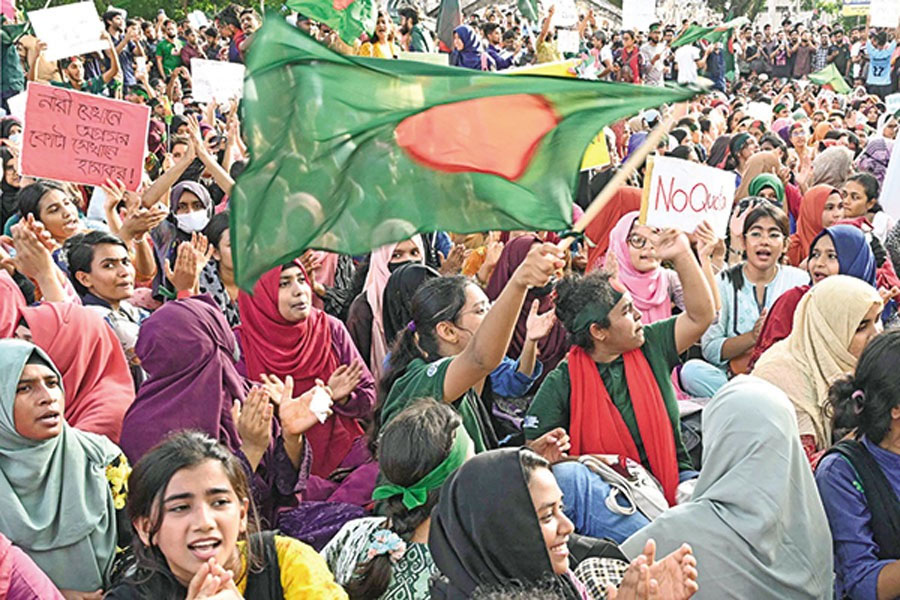
Published :
Updated :

The transformation of the modest one-point non-political quota reform student movement into nine-point political agitation following the death of six protestors including Abu Syed, and its successful culmination in bringing a powerful regime down are unique in history. There were student movements before and those were not confined to this country alone. In the 60s of the past century, the world was introduced to universal ideals of social justice, free speech, feminism and anti-war sentiment courtesy of the earth-shaking student movements. Governments, particularly the capitalist big powers had to incorporate all such ideals and principles to a certain degree in the state policy.
Although the uprising has some similarities with what is controversially termed the 'Arab Spring', it is distinct from the latter that had its origin in Tunisia and spread to other Arabian countries causing heads rolling at the top. The most remarkable similarity is the demonstration of youth force but in the Arab world, ruthless suppression of rebellion, counter revolution, civil war and military interventions by foreign powers ultimately turned the Arab Spring into an Arab Winter. In the very term, there is a reflection of the Western expectation for democratisation and when that expectation faded, it assumed the negative epithet.
In Bangladesh, the student-led protest initially did not even hint a rebellion against the authoritarian regime. Gradually did it shape into a passionate and aggressive campaign with the violence resorted to as a response by the state machinery. All that the coordinators or leaders of the non-political student movement have so far given to understand is that their objective is to establish a discrimination-free society. A call to that effect has prompted mass people to express their solidarity with students and join the movement. So, terming it a 'revolution' or 'second independence' seems to be a bit exaggeration. The courage and conviction as demonstrated by students and others in the face of brutality and insanity of the murderous law enforcers ushered in victory of the good over the evil.
However, snatching victory is one thing but achieving the stated goal is a completely different proposition. In this task, students could not expect a more experienced and expert team to accomplish the assignment in the key areas. Already six commissions have been formed to advance the cause. The recommended reforms will be placed for thorough deliberations with political parties before reaching a consensus on those.
Thus the interim government is on the right track so far. Until now, the issue of balancing power at the top has got currency in public debate and views of some political parties. The fact that the army chief has stated in no uncertain terms his support for Muhammad Yunus's government and ruled out the military's involvement in politics is quite reassuring. Yet the administrative reform may still fall far short of the right type of socio-political programmes to bring parity in opportunities and statuses between and among individuals and classes of people. An undefined and unelaborated term like anti-discrimination sets no specific agenda to follow.
The interim government cannot make the miracle happen. It can at best frame the legal instruments for the next elected government to endorse. Now the question is, will political parties which are all assemblies of privileged, opportunists and moneyed people go by the agreed formula once any of those achieve an overwhelming majority in the polls? Are they mentally prepared for socio-economic equity? Let alone communism which envisages elimination of class struggles and establishment of a classless society with the state controlling the means of production, property and wealth, even socialism is an anathema to them. Leftists in disarray here hardly stand any chance of emulating the feat of the Janata Vimukti Peramuna of Sri Lanka that has just won popular mandate to rule.
This leads to the query, what the starting point of the campaign would be. Where the dedicated communist leaderships of Soviet Union and China failed, uninitiated political elements will not feel the urge to embark on carrying out any such programme. After all, the elite, rich and privileged are the beneficiaries of the existing socio-political system. They are the last persons to take a logical approach to the problem of social inequality.
Dr Yunus has a privilege to have worked with the marginalised class in society but others in his team and those in commissions tasked with recommending reforms have no such experience. Even if the stake-holders agree on scripting the legal basis for opening the door to socio-economic equity, its execution will rest on the elected government. However, the process can safely be started with the confiscation of wealth illegally amassed by politicians and bureaucrats. The government of the United Kingdom (UK) has reportedly agreed to help return the laundered money. If this truly happens and other countries follow suit, the billions of Taka can solely be dedicated to poverty alleviation. Similarly, the confiscated wealth can be allocated for reviving the moribund small and medium enterprises and establishing more of those, training of workers, facilitating marketing of their products by creating a pool of transports to be operated under a cooperative system.
The most challenging part of bridging the yawning economic disparity is to take on the business and moneyed class. Their accumulation of wealth has not often gone the fair and honest ways. Restitution is what can address this problem. There is no better way than heavily taxing their enormous wealth. The revenue so earned can be spent on the welfare of the poor and the marginalised ushering in a reasonably sound socio-economic order.
nilratanhalder2000@yahoo.com


 For all latest news, follow The Financial Express Google News channel.
For all latest news, follow The Financial Express Google News channel.